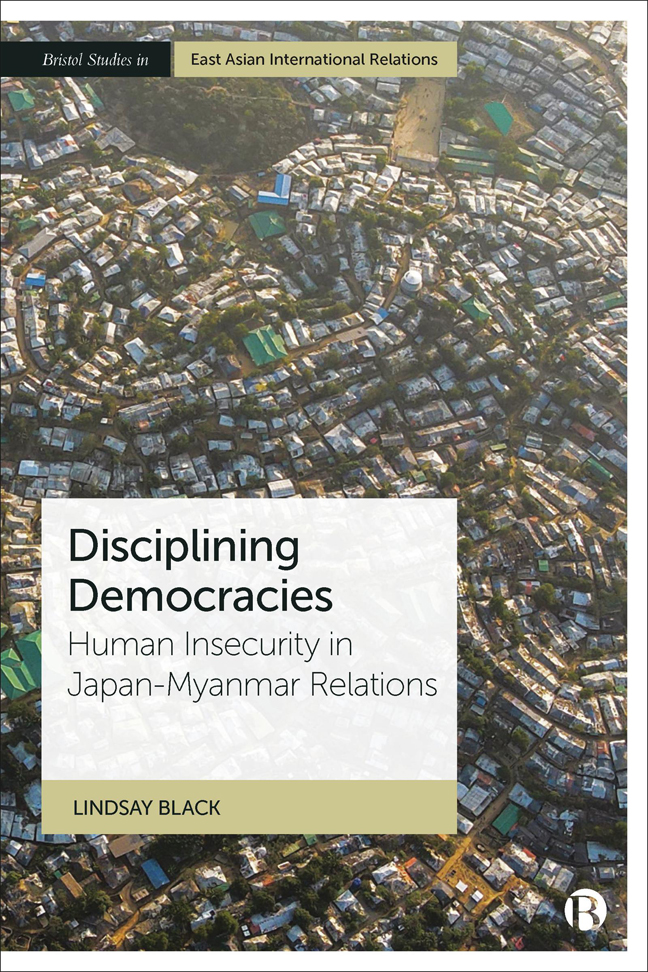Book contents
- Frontmatter
- Dedication
- Contents
- List of Abbreviations
- Acknowledgements
- Introduction
- 1 The Evolution of New Area Studies
- 2 ‘Asia's Liberal Leader’ and Human Insecurity
- 3 Japan as a ‘Bridge’: Facilitating Myanmar's Transition to a ‘Disciplined Democracy’
- 4 Japan and Special Economic Zones in Myanmar
- 5 Meddling for Profit: Japan's Peace-building Role in Myanmar
- 6 Dereliction of Responsibility: Japan's ‘Liberal Leadership’ in the 2016–20 Rakhine Crisis
- Conclusion: The Chimera of Progress
- Notes
- References
- Index
4 - Japan and Special Economic Zones in Myanmar
Published online by Cambridge University Press: 25 January 2024
- Frontmatter
- Dedication
- Contents
- List of Abbreviations
- Acknowledgements
- Introduction
- 1 The Evolution of New Area Studies
- 2 ‘Asia's Liberal Leader’ and Human Insecurity
- 3 Japan as a ‘Bridge’: Facilitating Myanmar's Transition to a ‘Disciplined Democracy’
- 4 Japan and Special Economic Zones in Myanmar
- 5 Meddling for Profit: Japan's Peace-building Role in Myanmar
- 6 Dereliction of Responsibility: Japan's ‘Liberal Leadership’ in the 2016–20 Rakhine Crisis
- Conclusion: The Chimera of Progress
- Notes
- References
- Index
Summary
Introduction
The human cost of economic development is the subject of the fourth chapter. The primary incentive of both the Japanese government and business in encouraging Myanmar's democratization process was to exploit the human and natural resources of the country. Myanmar's cheap, abundant and comparatively well-educated workforce would provide new opportunities for Japanese firms to shift production away from China, where costs were steadily mounting, to new and more profitable states. Alarmed by China's continued rise, the Abe administration encouraged Japanese businesses to diversify their investment portfolios for geostrategic, as well as economic, reasons through financial and regulatory support (Dooley and Inoue, 2020). Financially, the Japanese government would provide substantial debt relief, as well as both grant and loan aid to build key infrastructure that Myanmar lacked and that was needed to attract Japanese businesses. Regulatory support included assisting the Myanmar government in writing new investment laws that were favourable to Japanese businesses.
The Japanese government's support for Japanese business ventures in Myanmar was encapsulated in its sponsoring, through JICA, of the Thilawa SEZ. This landmark project put the ethical dimension of Japan's ODA programme in Myanmar to the test. The Thilawa SEZ should have been developed in accordance with JICA's ODA guidelines, which require that communities affected by the project be treated humanely and adequately compensated for any disruption to their lives and livelihoods. As Mekong Watch, a Japanese NGO, recorded, the land of the Thilawa residents was coercively appropriated, the residents were inadequately compensated and moved to an inappropriate relocation site where the quality of housing was poor and the conditions for life were unsanitary. Though the residents mounted a legal challenge against JICA with the help of Mekong Watch, JICA conducted its own investigation that found that it was ‘not in noncompliance’ with its own guidelines. JICA did seek to ameliorate conditions at the relocation site for the former residents of Thilawa, but minor improvements to the relocation site still forced its residents to be resilient, subject to a bare life on the margins of Myanmar's developing economy and society.
- Type
- Chapter
- Information
- Disciplining DemocraciesHuman Insecurity in Japan-Myanmar Relations, pp. 81 - 100Publisher: Bristol University PressPrint publication year: 2023



